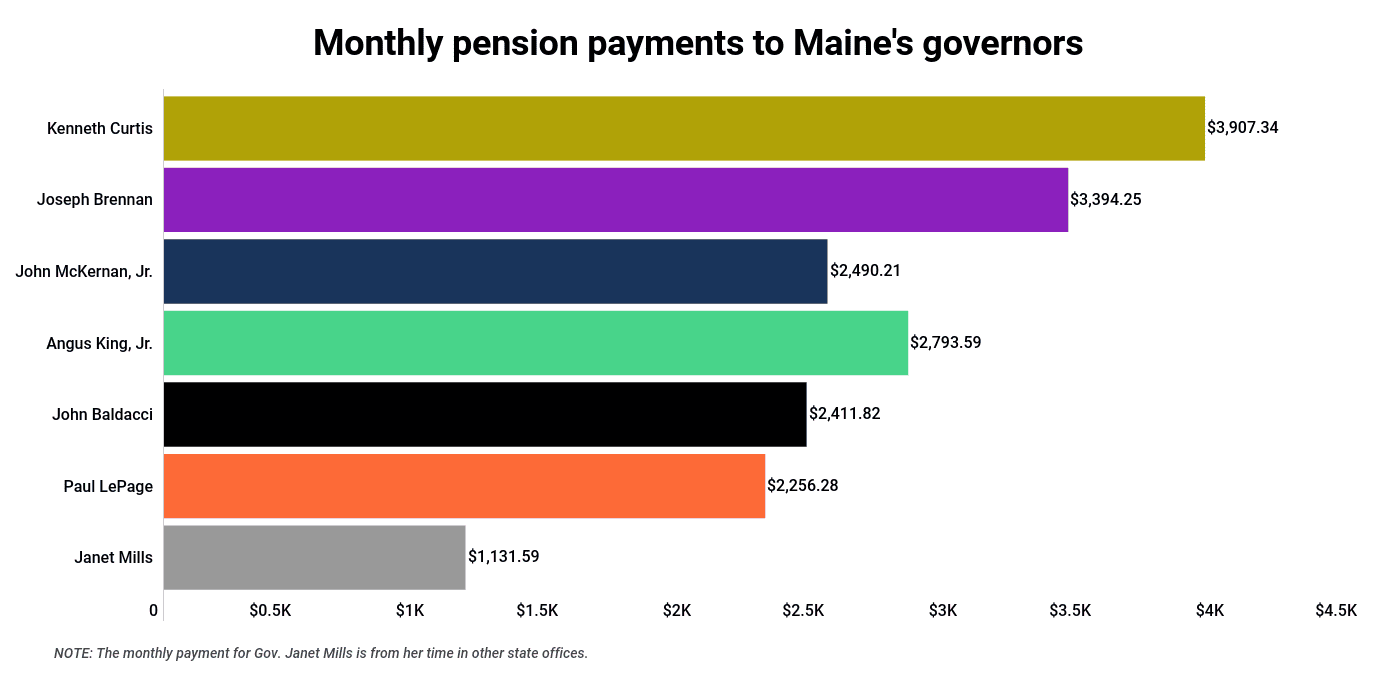If Paul LePage succeeds in winning back the governor’s office this November, he could become the first person to receive a gubernatorial pension while serving as Maine’s chief executive.
It’s not unprecedented to receive a state pension while serving as governor — Janet Mills, the current governor, receives about $13,300 per year from her time in other state offices — but LePage’s pension of about $27,000 a year is directly related to his time as governor.
The LePage situation is not clear-cut and likely would trigger a review by the state attorney general, but it also revives occasional complaints about what some call “double-dipping’’ by officials who receive a pension and a state salary.
Indeed, LePage himself once used that term to describe people receiving a pension and salary at the same time.

In 2013, according to the Portland Press Herald, LePage said double-dippers “suffered from ‘a character flaw,’ and called the practice ‘unconscionable’ and ‘absolutely disgusting.’ ”
LePage’s comments referred to school superintendents and came following a 2012 Press Herald investigation that found 1,228 Mainers were “working for the state and for local school districts while also collecting their Maine state pensions.”
A re-election, of course, is a long way off for the former GOP governor. LePage hasn’t considered whether he would place his pension on hold while governor or continue to receive it, his campaign said.
“We’re not measuring the curtains at the Blaine House,” said Brent Littlefield, a campaign strategist for LePage who also worked on his 2010 and 2014 campaigns. Littlefield said LePage will comply with any decisions regarding his pension, adding that the statute is very unclear and hasn’t been interpreted.
“However, Gov. LePage has made his thoughts known about this topic in the past,” Littlefield said, referencing LePage’s comments on school superintendents. Littlefield said LePage’s 2013 complaint was narrowly focused on one issue in particular and should not be used broadly.
In Mills’ case, she opted to receive her pension to keep the health benefits for her and her husband after Republicans chose a new attorney general in 2011.
When asked about her situation, Mills’ campaign initially said she had no choice but to continue receiving her pension from her time as attorney general once she decided to start collecting it. But, in reality, the law does not require employees to continue receiving their pension after they start.
The statute says “Any retiree or member who is retired or will retire may elect to reduce or discontinue receiving any benefit upon written request, duly certified and acknowledged, to the executive director.”
Michael Colleran, the Maine Public Employees Retirement System chief operating officer and general counsel, said while legal, it’s highly unusual for someone who has been receiving a pension to later forgo it.
“This almost never happens,” Colleran said. “We haven’t researched it, but we can’t remember an instance when somebody asked to stop their benefit.”
Colleran added that there is nothing prohibiting someone from resuming their benefits, but they can’t retroactively go back and receive missed payments.

Alexandra Raposo, a spokesperson for Mills’ campaign, said the governor was not aware of the provision that allows for discontinuing a pension. “Given that it continues to provide her health insurance, she will maintain it,” Raposo said.
“Both as attorney general, and, now, as governor, she has disclosed that she receives a pension as part of her annual public disclosure forms, as well as a Social Security benefit following the death of her husband in 2014,” Raposo said in a statement. “She has also shared this information with Maine people by making public her tax returns, which she plans to do again this year.”
In 2018, right before the election, the Maine GOP, with help from the National Republican Governors Association, ran an attack ad featuring various chips and dips, and calling Mills a “double-dipper.”
Maine’s gubernatorial salary is $70,000 a year — the lowest in the nation — meaning a former governor who has just turned 60 or left office receives roughly $26,000 yearly in retirement benefits. Those benefits, like other state pension plans, are eligible for cost of living adjustments.
LePage, the most recent governor to leave office, makes $2,256 per month, roughly $27,000 per year. Governors who left office long ago make significantly more because they have had more cost of living adjustments. For example, former Gov. Kenneth Curtis, who served from 1967 to 1975, makes $3,907 a month, or just under $47,000 per year.
LePage’s pension, despite being the lowest of Maine’s former governors, still exceeds the state employee and teacher retirement program average of $23,456 per year, according to the state retirement program’s annual financial report.
The pension benefit amounts were acquired by The Maine Monitor via a Maine Freedom of Access Act request.
While in office, governors contribute 7.65% of earnable compensation to the pension fund. Governors also have access to an expense account of $30,000 per year, have housing at the Blaine House and are reimbursed for travel expenses. Upon leaving office, governors are able to keep their desk and chair as a gift from the state, according to the governor’s compensation fact sheet.

The Maine Public Employees Retirement System hasn’t determined whether LePage would be eligible to receive his pension while governor. If LePage were elected, the AG’s office would be asked to interpret the statute, Colleran said.
“We look to the statutes as to what the governor should be paid as a former governor allowance,” said Colleran. “The statute does not address the situation where a former governor again becomes governor.”
The statute says that Maine governors (and their spouse if a governor dies) are eligible to receive three-eighths of their salary when “the former Governor reaches age 60 or leaves office, whichever comes later.”
Nicole Sacre, spokesperson for Attorney General Aaron Frey, said in an email that “should this situation arise and (we are asked) for advice, we would provide it, but we otherwise cannot comment on this hypothetical question.”
When Mills leaves the Blaine House, she will not be able to collect both her previous pension and the governor’s pension, Colleran said.
Mills’ has worked as a district attorney, a state representative, as attorney general and now as governor. Her current pension comes from her service before being elected governor. When she leaves office, she will have to choose which pension to receive.
“The governor can’t receive both those benefits and the former governor’s allowance,” Colleran said. “So under this current statute, when Gov. Mills leaves office, she’ll receive the former governor’s allowance.” Mills could instead choose to receive just her state employee program pension, but it is worth less.
Mills and LePage have dealt with their fair share of requests for Maine’s pension program. LePage is facing criticism for cuts he made to state pensions during his tenure, and Mills is handling calls from lawmakers and retirees to address inflation in cost of living adjustments.








